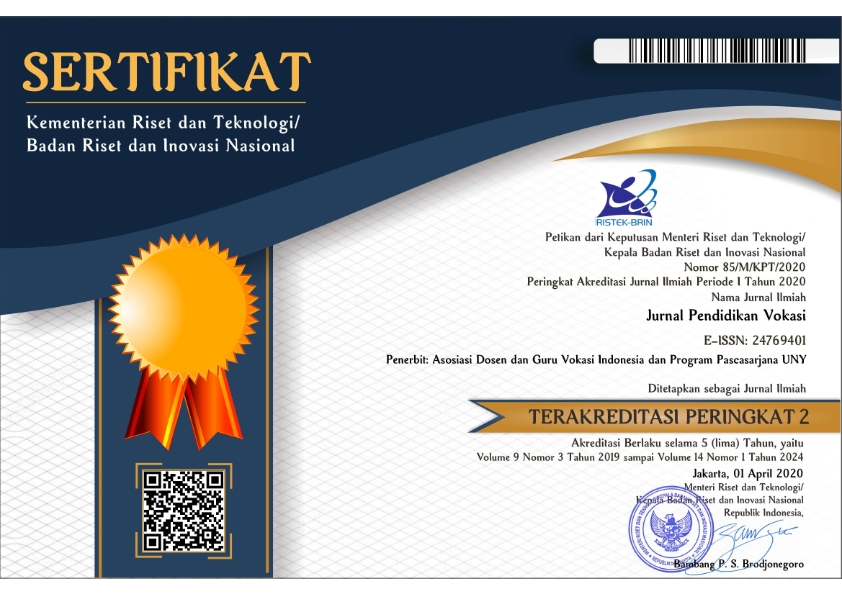Pengelolaan program studi desain dan teknologi sepatu di Akademi Teknologi Kulit Yogyakarta
DOI:
https://doi.org/10.21831/jpv.v4i2.2553Abstract
Penelitian bertujuan untuk: (1) mendapatkan informasi pengelolaan Program Studi (Prodi) Desain dan Teknologi Sepatu (DTS) di Akademi Teknologi Kulit (ATK) Yogyakarta,(2) mengetahui kesesuaian kurikulum Prodi DTS dengan dunia usaha atau industri (DUDI), dan (3) mengetahui kepuasan lulusan atas pengetahuan dan ketrampilan yang diperolehnya. Jenis penelitian ini adalah penelitian kualitatif dengan pendekatan studi kasus. Hasil penelitian ini adalah: (1) Kedudukan Prodi DTS berada dibawah direktur ATK, akan tetapi tanggung jawab, tugas dan wewenang secara langsung berada dibawah PD (Pembantu Direktur) 1 yang membidangi akademik atau pendidikan. Pengelola Prodi DTS meliputi: Ketua Prodi, Sekretaris Prodi, dan Kepala workshop. Ketua Prodi membawahi dosen, teknisi dan laboran. Tanggung jawab, tugas, dan wewenang Prodi hanya meliputi hal-hal yang terkait proses KBM teori maupun praktik;(2) Kurikulum Prodi DTS berbasis kompetensi yang disesuaikan dengan kebutuhan DUDI. Peninjauan kurikulum dilaksanakan dalam jangka waktu 4 tahunan. Hasil penelitian yang diambil dari pernyataan responden, yakni para mahasiswa tingkat akhir, dan alumni menyatakan bahwa kurikulum Prodi DTS sudah sesuai dengan DUDI. (3) Hasil penelitian mengungkapkan responden menyatakan puas akan pengetahuan dan ketrampilan dari Prodi DTS ATK Yogyakarta.
MANAGEMENT OF SHOES DESIGN AND TECHNOLOGY STUDY PROGRAMS IN LEATHER TECHNOLOGY ACADEMY YOGYAKARTA
Abstract
This study aims to: (1) obtain information about the management of the Study Program of Shoe Design and Technology (SDT) in the Leather Technology Academy (LTA) of Yogyakarta, (2)`find out the relevance of the curriculum to the industrial or business sector, and (3) investigate the graduates' satisfaction of knowledge and skills that they obtain from the institution. It was an evaluation study employing the qualitative approach. It was not intended to test whether a hypothesis was accepted or rejected but it was focused on the data collection to describe the actual conditions in the field. The results of the study show that: (1) The position of the study program in the organizational structure is under the Director of LTA. However, the coordination of responsibility, duty, and authority is directly under the Vice Dean (VD) I in charge of academic or educational affairs. The managerial board of the study program consists of the Head of the Study Program, the Secretary, and the Coordinator of the Workshop. In the job specification, the Head of the Study Program also supervises the lecturers, technicians, and laboratory personnel. (2) The curriculum implemented in the study program is competency-based with an objective of producing graduates with competencies demanded by the industry; the curriculum is periodically reviewed in four years. The results of the study based on the statements from the respondents, show that the curriculum in the study program is already relevant to the needs. (3) The results of the study based on the statements from the respondents, show that they are satisfied with the skills/competencies acquired or learned in the Study Program of SDT in LTA.
References
Beane, J. A., Teopfer, C. F., & Alessi, S. J. (1986). Curriculum planning and development. Boston: Allyn and Bacon Inc.
Bush, T. (2008). Leadership and management development in education. T.J International, Padstow, Cornwall.
Tjiptono, F. (2005). Prinsip-prinsip total quality service. Yogyakarta: Andi Offset.
Nafukho, F. M., Graham, C. M., & Kacirek, K. (2010). Education service agency audits: Reinforcing the need for systematic evaluation. International Journal of Vocational Education and Training, 17(2). ISSN: 1075-2455.
Griffin, R. W. (2004). Management. Boston: Houghton Mifflin Company.
Irawan, H. (2002). 10 Prinsip kepuasan pelanggan. Jakarta: Gramedia Pustaka Utama.
Hasibuan, M. (2003). Manajemen: dasar, pengertian, dan masalah. Jakarta: Bumi Aksara.
Hikmat. (2009). Manajemen pendidikan. Bandung: CV Pustaka Setia.
Muhajir, N. (2000). Metodologi penelitian kualitatif. Yogyakarta: Rake Sarasen.
Hamalik, O. (2003). Kurikulum dan pembelajaran. (Edisi revisi). Jakarta: PT Bumi Aksara.
Oliva, P. F. (1992). Developing the curriculum. (Third edition). New York: Harper Collins Publisher.
Oliver. (1997). Manajemen pelanggan. Yogyakarta: Andi Offset.
Riandi. (2013). Pengelolaan laboratorium. Retrieved June 8, 2013, from http://file.upi.edu/Direktori/FP-MIPA/JUR._PEND._BIOLOGI/196305011988031RIANDI/Bahan_Kuliah/Pengelolaan_Laboratorium.pdf.
Schoderbek, P. P., Cosier, R. A., & Aplin, J. C. (1988). Management. London: Harcourt Brace Jovanovich Publishers.
Robbins, S. P. (2002). Organization theory concepts and cases. Prentice Hall.
Arikunto, S. (2012). Manajemen pendidikan. Yogyakarta: Aditya Media bekerjasama dengan FIP UNY.
Abbas, S. (2008). Manajemen perguruan tinggi. Aceh: Prenada Media Group.
Terry, G. (2010). Dasar-dasar management. Jakarta: PT. Bumi Aksara.
Undang Undang No. 20 Tahun 2003. Sistem pendidikan nasional. Jakarta: Depdikbud.
Downloads
Published
How to Cite
Issue
Section
License
The authors submitting a manuscript to this journal agree that, if accepted for publication, copyright publishing of the submission shall be assigned to Jurnal Pendidikan Vokasi. However, even though the journal asks for a copyright transfer, the authors retain (or are granted back) significant scholarly rights.
The copyright transfer agreement form can be downloaded here: [JPV Copyright Transfer Agreement Form]
The copyright form should be signed originally and sent to the Editorial Office through email to jpvokasi@uny.ac.id
Jurnal Pendidikan Vokasi by http://journal.uny.ac.id/index.php/jpv is licensed under a Creative Commons Attribution-ShareAlike 4.0 International License.














